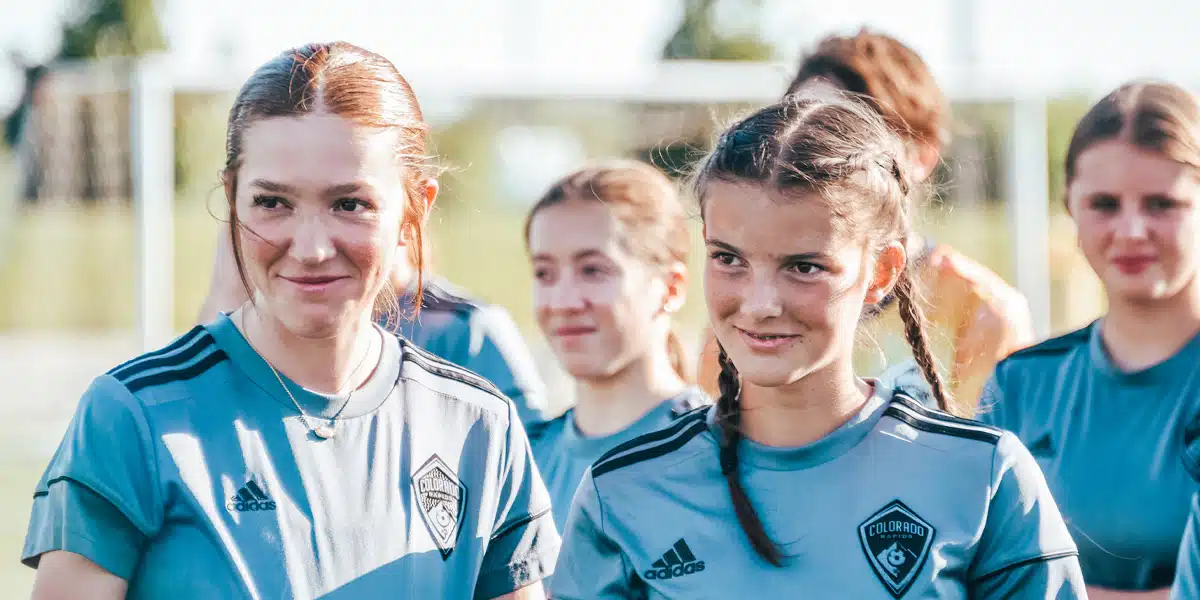
Hellooooo fair readers and welcome back! Is it just me, or does it feel like we’ve been apart for far too long?? As I sit on my couch, writing the fourth version of this introduction, I do so with a unique sense of weight. You see, the blog you have before you happens to be the last one that I will pen here at CRYSC. Yes, after five years of having the great privilege of working for and with so many of our staff and families, another chapter of life beckons. At the risk of sounding overly nostalgic, I have absolutely loved the opportunity to connect with you through these blogs, and will very much miss writing them. With that in mind, it will come as little shock to hear that I struggled mightily over the past several weeks to decide on what to leave you all with.
I’ve learned and grown a ton at this club, and throughout the eight years I have spent working in and around the beautiful and chaotic world of youth sport (a number that doesn’t hold a candle to that of many others I’ve worked alongside!). I have seen firsthand the immeasurable amount of good that sport can do; it can help us build crucial life skills, create lifelong relationships, provide opportunities, and guide self-discovery. I’ve also experienced an overwhelming majority of people within youth sport – coaches, parents, athletes – to be genuinely decent humans who earnestly want nothing more than to create fun, positive sport experiences for every kid.
And yet, as with all things, another side of this coin exists. Despite its simplicity and overarching support, consistently delivering on the objective of creating positive sport experiences for every kid can prove harder than it should. Why? Now that is a complex question. In my view, it lies at the cross-section of a number of realities. Among them: The reality that youth sport has evolved into a business that isn’t inherently built to always provide such experiences; the reality that our culture is one of unprecedented comparison, anxiety, scarcity, and achievement; the reality that this space is awash with love – for the game, for our kids – and love can make things messy; the reality that all of us constantly receive an onslaught of messaging around everything we should be doing and considering for ourselves, our teams, our kids.
Regardless of the underpinning(s), I feel it is essential to acknowledge that sport is not innately good; participation, alone, does not guarantee the massively positive returns we know that youth sport can yield. Rather, like most things, youth sport itself is neutral. It becomes good when we, the people within it, put forth the care, effort, and intention to make it so. Having sat opposite hundreds of you asking how you can best support your team/child/self through the journey of youth sport, I know many of you are well aware of this. I also know that making sure we are doing everything “right” to ensure our kids reap all of the benefits of sport (while protecting them from any harm) can feel a bit overwhelming.
Which brings me to this question: With so much available to us – information, opinion, opportunity – what really matters, here? At the end of the day, if we could only hold onto three nuggets of information that would help us do our part in making sure our, and every, kid gets all of the good out of youth sport, what would they be? If you’re interested in my (incredibly subjective, one among millions) take, read on.
The Universal Foundation
Alright: There is a chance I’m cheating right off the bat (it’s my last blog, cut me a break, eh?!). I did say three nuggets per group, and we’ll get to that, but there’s a really important ground zero nugget that applies to everyone! I’ll make it quick I promise.
Ahem. The single most important trait that any of us can possess, the skill that underlies all others, is self-awareness. Borrowing from Tasha Eurich, self-awareness is the ability to see ourselves clearly; to understand who we are (our values, goals, strengths, weaknesses, thoughts, emotions, re/actions), how we fit into the world around us, and how others see us. Both intuitive and easily overlooked, if we want to do our best by ourselves and our athletes, we have to commit to the lifelong endeavor of working to know ourselves. A key ingredient for ongoing personal growth, self-awareness helps us build stronger relationships, lead and communicate better, and feel happier and more confident. It gives us the information we need to self-regulate; to manage our egos; to ensure that we aren’t working our own stuff out through our athletes; to examine and rewrite our narratives. Crucially, it allows us to bring our love and excitement (for soccer, for learning, for each other) onto the soccer field. What is more powerful than that??
So: Set aside time for reflection. Engage in thoughtful conversation. Practice mindfulness. Seek feedback. Heck, consume fiction (a fantastic awareness-raising tool)! No matter your avenue, make getting to know yourself better a top priority. I guarantee it will invite and create so much good into your and your squad’s lives, on and off the field.
For the Coaches
Alright coaches, because we have spent so much glorious (just me?) time together over the years, you’re up first. While you’re working to know yourself better – specifically, examining your narratives around today’s kids and parents, unpacking your own athletic experiences, and connecting to your WHY as a coach – I know that the bulk of you are sincerely invested in providing your kids a joyous soccer experience. In that pursuit, keep in mind:
- Above All, Connect: Building genuine relationships with our athletes and ensuring they know how much we care about them as people is the most important thing we can do as a coach. Full stop. There is no substitute or workaround. Be willing to share your true self, have fun on the field, and invite your athletes to do the same. Such connection begets belonging, which is the most powerful feeling we can co-create with our athletes. So if you do nothing else, make your kids feel seen, heard, valued, and loved.
- Make it Safe: Growth, failure, bravery, honesty, passion, accountability – these are all features of sport. They also all stand to be incredibly uncomfortable, especially for youth. If we want kids to consistently seek out such discomfort, we have to make them feel safe; safe to take risks, safe to be themselves, safe to challenge. As the lead architect and protector of our team environments, this crucial work starts with us.
- Stay Curious: Coaching is naturally (and dangerously) egocentric. We hold the most power, we are the most knowledgeable, and our athletes’ eyes are on us. Remember: We don’t know everything, our voice is not the most important voice, and we’re going to mess up. Ask questions, seek input, challenge your thinking, lend choice, own your failures, and know that your kids have just as much to teach you as you do, them.
For the Caregivers
Up next, the real MVPs. When it comes to sport parents/parent-figures, I hear myself echoing two refrains. 1) Parents love their kids a ton. 2) Parenting seems very, very hard. Because I am not a parent, I make a point to avoid giving direct advice to this group who seem to be doing the best they can with a really tough gig. Today, though, I’ll give it to you straight. As you support your kids through their exciting, and often challenging, youth sport experience:
- Take Care: In order to show up best for our kids, we have to first show up for ourselves. As unrealistic as it may feel, work with your village to create time for you. Invest in your friendships, make time for play, and give yourself grace with the knowledge that in doing so, we give our kids permission to do the same.
- Get to Know Your Kids: I know this feels like a no-brainer, but stay with me. It is incredibly easy for even the most well-intentioned parents to make assumptions about who our kids are, what they want, and what they need from us. Kids are in a constant state of discovery, change, and becoming. Ask your kids questions, let them lead, and know that being understood is far more powerful than being praised or critiqued.
- Demonstrate Value: A huge percentage of today’s youth wrongfully perceive that their value as humans is contingent on their achievement (in soccer, school, dance). Surprising no one, this entanglement of self-worth and achievement is immensely unhealthy. If you send one message to your kids, through your words and actions, let it be that their worth is absolute and their value to us never fluctuates – win, lose, or draw.
For the Youngers
And now, for the people who sit at the heart of this. I know you have access to more information than can possibly be useful, I know that my voice is one of many lending their unsolicited two cents, and I know that you are capable of navigating this time of your life without my input. And I wholeheartedly agree. Nevertheless, for what it’s worth, this is what I have for you:
- Be Here, Now: Beyond exploring and being yourself, the most powerful skill you can possess as an athlete is that of being present. To learn the most, perform the best, and have the most fun, you must learn to engage with your thoughts and feelings in such a way that allows you to devote your full attention to the now. Take a breath, and be where your feet are. After all, it’s the only moment that we have.
- Go and Fail: A number of you are unwilling to fail. So much so that I’ve seen you actively decide against putting forth your full effort for fear of doing so and coming up short. Guess what: We all fail. You’ll never know who you can be or what you can do if you attempt to orchestrate it out of your life. Seek out discomfort, go be bad at things, and find out what you’re made of. I promise you it is worth it.
- Have Fun: Sport (like life) can be hard. You’re going to underperform, you’re going to lose, and one day you’re going to be done. The unmatchable FUN makes the hard worth it. So seek joy, and create joy, every time you step onto the field. And if playing soccer doesn’t bring you joy, go find something that does. You’ve got one life, so do what you want and what you love and enjoy every single minute.
That’s All She Wrote
And, there we have it! If you’ve come to the end of this blog feeling like it was simple, intuitive, and chock full of things you’ve heard before – you’re far too kind. While I’m sorry to disappoint those seeking groundbreaking insights and dazzling layers of complexity akin to those I normally provide (is the sarcasm coming across??), what I’ve ultimately uncovered is that the crux of getting all of the good out of youth sport lies in repeatedly doing the simple, human things incredibly well. Yep, despite how it can feel, it seems to me that our respective jobs are actually quite simple. Massively important, but simple: Connect. Care. Try. Fail. Grow. Create joy. And, in doing this, know that all of us – coaches, caregivers, opponents, teammates – are on the same team. The team that wants every single kid (and adult) that steps onto the field to have FUN; to learn and grow – within the game, but more importantly within themselves; and to look back on their journey with gratitude and joy for what it brought to their lives, and what they gave back to it. That is the beauty of sport, and that is the charge that I leave you with. And, while I’m no longer on the pitch, know that I am forever on your sideline, cheering you on, and believing in you. Good luck, and go, team!









